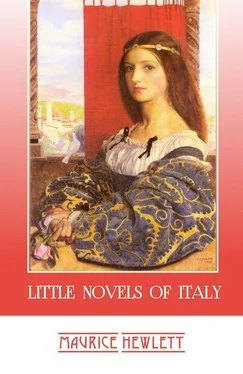Maurice Hewlett - Little Novels of Italy
Здесь есть возможность читать онлайн «Maurice Hewlett - Little Novels of Italy» весь текст электронной книги совершенно бесплатно (целиком полную версию без сокращений). В некоторых случаях можно слушать аудио, скачать через торрент в формате fb2 и присутствует краткое содержание. Город: New York ; London, Год выпуска: 1899, Издательство: The Macmillan Company : Macmillan & Co., Ltd., Жанр: Историческая проза, на английском языке. Описание произведения, (предисловие) а так же отзывы посетителей доступны на портале библиотеки ЛибКат.
- Название:Little Novels of Italy
- Автор:
- Издательство:The Macmillan Company : Macmillan & Co., Ltd.
- Жанр:
- Год:1899
- Город:New York ; London
- ISBN:нет данных
- Рейтинг книги:4 / 5. Голосов: 1
-
Избранное:Добавить в избранное
- Отзывы:
-
Ваша оценка:
- 80
- 1
- 2
- 3
- 4
- 5
Little Novels of Italy: краткое содержание, описание и аннотация
Предлагаем к чтению аннотацию, описание, краткое содержание или предисловие (зависит от того, что написал сам автор книги «Little Novels of Italy»). Если вы не нашли необходимую информацию о книге — напишите в комментариях, мы постараемся отыскать её.
(1899), a collection of brilliant short stories, English historical novelist, poet and essayist, Maurice Hewlett showed again his power of literary expression together with a close knowledge of medieval Italy.
На обложке: акварель «Молли, герцогиня Ноны» (Molly, Duchess of Nona, 1905) английского художника Фрэнка Кадогана Коупера (Frank Cadogan Cowper).
Little Novels of Italy — читать онлайн бесплатно полную книгу (весь текст) целиком
Ниже представлен текст книги, разбитый по страницам. Система сохранения места последней прочитанной страницы, позволяет с удобством читать онлайн бесплатно книгу «Little Novels of Italy», без необходимости каждый раз заново искать на чём Вы остановились. Поставьте закладку, и сможете в любой момент перейти на страницу, на которой закончили чтение.
Интервал:
Закладка:
LITTLE NOVELS OF ITALY
by
Maurice Hewlett
author of "The Forest Lovers," "Pan and The Young Shepherd," "Earthwork out of Tuscany," etc.
To
HIS FRIEND
And
ITALY'S
MAJOR-GENERAL JOSEPH BONUS, R.E.
THE AUTHOR
DEDICATES HIS BOOK
Madonna of The Peach-Tree
I
VANNA IS BID FOR
Not easily would you have found a girl more winning in a tender sort than Giovanna Scarpa of Verona at one and twenty, fair-haired and flushed, delicately shaped, tall and pliant, as she then was. She had to suffer her hours of ill report, but passes for near a saint now, in consequence of certain miracles and theophanies done on her account, which it is my business to declare; before those she was considered (if at all) as a girl who would certainly have been married three years ago if dowries had not been of moment in the matter. In a city of maids as pretty as they are modest—which no one will deny Verona to be—there may have been some whose charms in either kind were equal to hers, while their estate was better in accord; but the speculation is idle. Giovanna, flower in the face as she was, fit to be nosegay on any hearth, posy for any man's breast, sprang in a very lowly soil. Like a blossoming reed she shot up to her inches by Adige, and one forgot the muddy bed wondering at the slim grace of the shaft with its crown of yellow atop. Her hair waved about her like a flag; she should have been planted in a castle; instead, Giovanna the stately calm, with her billowing line, staid lips, and candid grey eyes, was to be seen on her knees by the green water most days of the week. Bare-armed, splashed to the neck, bare-headed, out-at-heels, she rinsed and pommelled, wrung and dipped again, laughed, chattered, flung her hair to the wind, her sweat to the water, in line with a dozen other women below the Ponte Navi; and if no one thought any the worse of her, none, unhappily, thought any the better—at least in the way of marriage. It is probable that no one thought of her at all. Giovanna was a beauty and a very good girl; but she was a washerwoman for all that, whose toil fed seven mouths.
Her father was Don Urbano, curate of Santa Toscana across the water. This may very easily sound worse than it is. In Don Urbano's day, though a priest might not marry, he might have a wife—a faithful, diligent companion, that is—to seethe his polenta, air his linen, and rear his children. The Church winked at her, and so continued until the Jesuits came to teach that winking was unbecoming. But when Can Grande II. lorded in Verona the Jesuits did not, and Don Urbano, good, easy man, cared not who winked at his wife. She gave him six children before she died of the seventh, of whom the eldest was Giovanna, and the others, in an orderly chain diminishing punctually by a year, ran down to Ferrantino, a tattered, shock-headed rascal of more inches than grace. Last of all the good drudge, who had borne these and many other burdens for her master, died also. Don Urbano was never tired of saying how providential it was that she had held off her demise until Giovanna was old enough to take her place. The curate was fat and lazy, very much interested in himself; his stipend barely paid his shot at the "Fiore del Marinajo," under whose green bush he was mostly to be seen. Vanna had to roll up her sleeves, bend her straight young back, and knee the board by the Ponte Navi. I have no doubt it did her good; the work is healthy, the air, the sun, the waterspray kissed her beauty ripe; but she got no husband because she could save no dowry. Everything went to stay the seven crying mouths.
Then, on a day when half her twenty-first year had run after the others, old Baldassare Dardicozzo stayed on the bridge to rest from the burden of his pack—on a breezy March morning when the dust filled his eyes and the wind emptied him of breath. Baldassare had little enough to spare as it was. So he dropped his load in the angle of the bridge, with a smothered "Accidente!" or some such, and leaned to watch the swollen water buffeted crosswise by the gusts, or how the little mills amid-stream dipped as they swam breasting the waves. In so doing he became aware, in quite a peculiar way, of Vanna Scarpa.
Baldassare was old, red-eyed, stiff in the back. Possibly he was rheumatic, certainly he was grumpy. He had a long slit mouth which played him a cruel trick; for by nature it smiled when by nature he was most melancholy. Smile it would and did, however cut-throat he felt: if you wanted to see him grin from ear to ear you would wait till he had had an ill day's market. Then, while sighs, curses, invocations of the saints, or open hints to the devil came roaring from him, that hilarious mouth of his invited you to share delights. You had needs laugh with him, and he, cursing high and low, beamed all over his face. "To make Baldassare laugh" became a stock periphrasis for the supreme degree of tragedy among his neighbours. About this traitor mouth of his he had a dew of scrubby beard, silvered black; he had bushy eyebrows, hands and arms covered with a black pelt: he was a very hairy man. Also he was a very warm man, as everybody knew, with a hoard of florins under the flags of his old-clothes shop in the Via Stella.
Having spat into the water many times, rubbed his hands, mopped his head, and cursed most things under heaven and some in it, Master Baldassare found himself watching the laundresses on the shore. They were the usual shrill, shrewd, and laughing line—the trade seems to induce high mirth—and as such no bait for the old merchant by ordinary; but just now the sun and breeze together made a bright patch of them, set them at a provoking flutter. Baldassare, prickly with dust, found them like their own cool linen hung out to dance itself dry in the wind. Most of all he noticed Vanna, whom he knew well enough, because when she knelt upright she was taller and more wayward than the rest, and because the wind made so plain the pretty figure she had. She was very industrious, but no less full of talk: there seemed so much to say! The pauses were frequent in which she straightened herself from the hips and turned to thrust chin and voice into the debate. You saw then the sharp angle, the fine line of light along that raised chin, the charming turn of the neck, her free young shoulders and shapely head; also you marked her lively tones of ci and si , and how her shaking finger drove them home. The wind would catch her yellow hair sometimes and wind it across her bosom like a scarf; or it streamed sideways like a long pennon; or being caught by a gust from below, sprayed out like a cloud of litten gold. Vanna always joined in the laugh at her mishap, tossed her tresses back, pinned them up (both hands at the business); and then, with square shoulders and elbows stiff as rods, set to working the dirt out of Don Urbano's surplice. Baldassare brooded, chewing straws. What a clear colour that girl had, to be sure! What a lissom rascal it was! A fine long girl like that should be married; by all accounts she would make a man a good wife. If he were a dozen years the better of four and fifty he might—Then came a shrug, and a "Ma!" to conclude in true Veronese Baldassare's ruminations. Shrug and explosion signalled two stark facts: Baldassare was fifty-four, and Vanna had no portion.
Yet he remained watching on the bridge, his chin buried in his knotty hands, his little eyes blinking under stress of the inner fire he had. So it befell that La Testolina saw him, and said something shrill and saucy to her neighbour. The wind tossed him the tone but not the sense. He saw the joke run crackling down the line, all heads look brightly up. The joke caught fire; he saw the sun-gleam on a dozen perfect sets of teeth. Vanna's head was up with the rest, sooner up and the sooner down. Even from that height the little twinkling beacons from the bridge shot her through. He saw her colour deepen, head droop; she was busy long before the others had wrung their joke dry. "Soul of a cat!" grunted Baldassare between his teeth, "what a rosy baggage it is!" He waited a little longer, then deliberately passed the bridge, rounded the pillar by the steps, and went down to the women like a man who has made up his mind. Lizabetta of the roving eye caught the first hint of his shadow. Her elbow to Nonna's ribs, Nonna's "Pst!" in Nina's ear, spread the news. Vanna's cheeks flew the flag.
Читать дальшеИнтервал:
Закладка:
Похожие книги на «Little Novels of Italy»
Представляем Вашему вниманию похожие книги на «Little Novels of Italy» списком для выбора. Мы отобрали схожую по названию и смыслу литературу в надежде предоставить читателям больше вариантов отыскать новые, интересные, ещё непрочитанные произведения.
Обсуждение, отзывы о книге «Little Novels of Italy» и просто собственные мнения читателей. Оставьте ваши комментарии, напишите, что Вы думаете о произведении, его смысле или главных героях. Укажите что конкретно понравилось, а что нет, и почему Вы так считаете.











